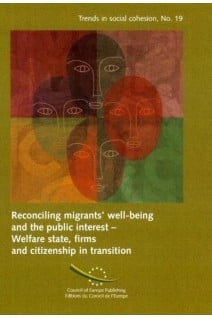



This volume has two purposes. First, it looks at why migrant welfare is not always acknowledged as forming part of the general well-being of host countries. And second, by suggesting alternative approaches, it sets out to help bring about a "just, multicultural society", in which rights and mobility are realities for everyone.The radical changes currently under way in the welfare state, in private enterprise and in the various manifestations of citizenship are a perfect starting point for showing that the rights of migrants and nationals, far from being in competition, actually reinforce each other.While rejecting the essentialisation of "diversities", the authors call for greater cultural accommodation in all walks of life - in institutions and businesses, social services and hospitals, families and associations - to better meet the needs of multicultural societies.
Preface
Foreword
Part I - Migrants and social cohesion: a problem of "cultural diversity"?
I. Policies for a fair multicultural society. On the use and abuse of "culture" in relation to migration issues
II. Religious pluralism and social cohesion: making religions an element of mutual recognition
Part II - Migrants, diversity and changes in the welfare state
A. Insecurity of migrants - controlled by the state, feared by the community
I. Modern migrants and new slaves. How the UK welfare state denies well-being, enforces immigration control and creates slavery
II. What security for migrants and their children? Thoughts inspired by the Catalan example
III. Migration and demographic issues in Europe: policy implications
B. The welfare state: between inequality and universalism conscious of diversity
I. Welfare systems and migrant minorities: the cultural dimension of social policies and its discriminatory potential
II. "Cultural otherness" or the ethnicisation of poverty? Some considerations on how post-communist welfare reforms affect Hungary's Roma minority
III. Tailoring a universal health-care system to diversity: the hospital's good intentions put to the test by its immigrant users
Part III - Migrants, diversity and changes in firms
I. The attitude of companies to migrant workers and their "differences": challenging the current trends towards irresponsibility
II. How the business sector contributes to migrant welfare: principles, strategies and tools for a responsible "diversity" policy
III. Understanding and supporting ethnic minority businesses: some considerations on the UK situation
Part IV - Migrants, diversity and the changing patterns of citizenship
I. Exclusive versus inclusive citizenship: the role of prisons in the governance of contemporary migration
II. Making citizenship an instrument for empowering migrants
III. Making space for Islam in Europe: exploring transnational practices of citizenship
and belonging

This volume has two purposes. First, it looks at why migrant welfare is not always acknowledged as forming part of the general well-being of host countries. And second, by suggesting alternative approaches, it sets out to help bring about a "just, multicultural society", in which rights and mobility are realities for everyone.The radical changes currently under way in the welfare state, in private enterprise and in the various manifestations of citizenship are a perfect starting point for showing that the rights of migrants and nationals, far from being in competition, actually reinforce each other.While rejecting the essentialisation of "diversities", the authors call for greater cultural accommodation in all walks of life - in institutions and businesses, social services and hospitals, families and associations - to better meet the needs of multicultural societies.
Attention, en vertu de nos conditions générales de vente, l'achat des PDF/epub est réservé aux particuliers.
